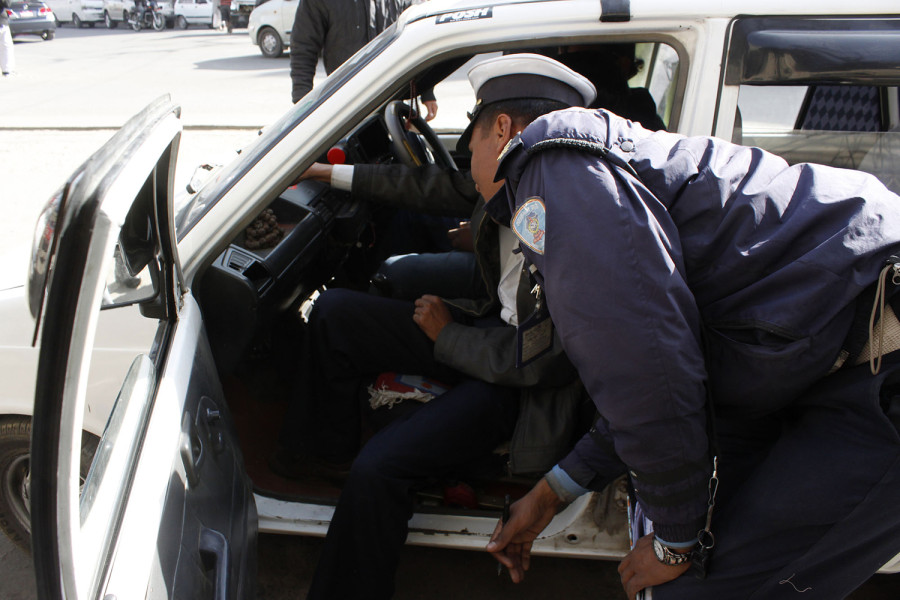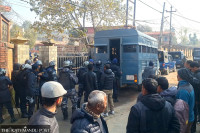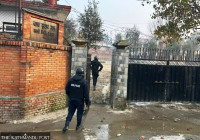Valley
Traffic police to constitute task force to monitor public transport anomalies
Every day, personnel will be deployed in plain clothes to monitor wrongdoings by public vehicle operators.
Anup Ojha
Using public transport in Kathmandu is a cumbersome affair. Passengers often complain not only about being forced to travel on overcrowded vehicles but also about overcharging by taxis.
Despite traffic police’s measures in the past and officials’ repeated commitments to address the problems, there has been little respite for commuters.
When Senior Superintendent of Police Bhim Prasad Dhakal took charge of the Metropolitan Traffic Police Division in September, he committed to taking drastic measures to ease traffic congestion in the city as well as make things easier for public transport users.
With complaints piling at his office over the months, Dhakal last week decided to go on the roads and see the situation for himself.
On Thursday, Dhakal hung his uniform at his office and put on a pair of jeans and a jacket and travelled on public vehicles—buses, microbuses and taxis—on different routes.
“I wanted to get a first-hand experience. During my two hours of travel in public vehicles, I found a lot of problems in the public transportation sector,” Dhakal told the Post on Saturday.
He said when he boarded a Nepal Yatayat bus, he took the back seat and found the vehicle had been carrying more passengers than its capacity.
At the Civil Hospital’s gate in New Baneshwor, a taxi refused to take him by the meter fare. “I found microbuses with rickety seats had passengers packed like sardines,” said Dhakal.
He said he did not initiate action against anyone, but warned all those who were not abiding by the rules.
Dhakal said that he is going to form a special task force under his watch this week, and traffic police personnel will be deployed in civil dress to monitor wrongdoings by public vehicles.
“The traffic rule violators will be punished as per the law. I, myself, will be monitoring in the field, once a week, in civil dress,” said Dhakal.
The division’s data shows that around 1.2 million vehicles, including two-wheelers, three-wheelers and four-wheelers, are on the roads of the Valley. Of the vehicles, 92 percent are private, while only eight percent are public vehicles. The Department of Transport Management’s data shows 12,616 buses, 1,343 micro-buses and 2,525 tempos are being operated in the Kathmandu Valley every day along with an estimated 10,000 taxis.
The Division deploys 1,368 traffic police personnel on the streets of Kathmandu Valley to manage traffic.
“There has not been an increase in traffic police quotas for more than half a decade. The current number of traffic police personnel is inadequate,” said Dhakal.
The Metropolitan Traffic Police Division has set up a hotline number—103—for consumers to file complaints whenever they are cheated or face any problem on the roads. The traffic office has appealed to all to dial 103 if they face hassles while using public vehicles.
Apart from that, the division office has also requested passengers to lodge complaints via social media platforms—the Facebook page, Metropolitan Traffic Police Division, and the twitter handle, @Valleytraffic.
“We have a system in place which ensures traffic personnel can reach the site within five minutes of getting a complaint via phone call,” said Dhakal.
Data at the traffic police office show that it receives an average of 2,500 complaints every day via phone calls, mostly regarding the overcharging of passengers, taxis refusing to switch on meters, and misbehaviour by bus conductors and drivers. Around 40 complaints are registered via social media on a daily basis.
Last year, the division office took action against more than 10,000 errant taxi drivers for violating traffic rules in five months.
Taxi drivers refusing to go by the meter or declining to go to the designated places are fined Rs3,000, while those drivers who are found tampering the meter are sent to the Nepal Standards and Metrology Department for further action.
Advocates of consumer rights commended the traffic office’s move to send officials on the ground to curb irregularities, but they called for putting up a proper system in place.
“This is a good drive, but it’s old fashioned,” said Hari Mainali, secretary at the Forum for Protection of Consumer Rights Nepal. “The traffic police office should put a system in place.”




 20.12°C Kathmandu
20.12°C Kathmandu.jpg)












